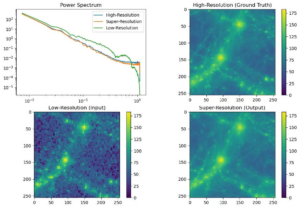By Jason Daley, UW–Madison College of Engineering

For millennia, humans have used optical telescopes, radio telescopes and space telescopes to get a better view of the heavens.
Today, however, one of the most powerful tools for understanding the cosmos is the computer chip: Cosmologists rely on processing power to analyze astronomical data and create detailed simulations of cosmic evolution, galaxy formation and other far-out phenomena. These powerful simulations are starting to answer fundamental questions of how the universe began, what it is made of and where it’s likely headed.
“It is extremely expensive to run these simulations and basically takes forever,” says Kangwook Lee, an assistant professor of electrical and computer engineering at the University of Wisconsin-Madison. “So they cannot run them for large-scale simulations or for high-resolution at that same time. There are a lot of issues coming from that.”
Instead, machine learning expert Lee and physics colleagues Moritz Münchmeyer and Gary Shiu are using emerging artificial intelligence techniques to speed up the process and get a clearer view of the cosmos.